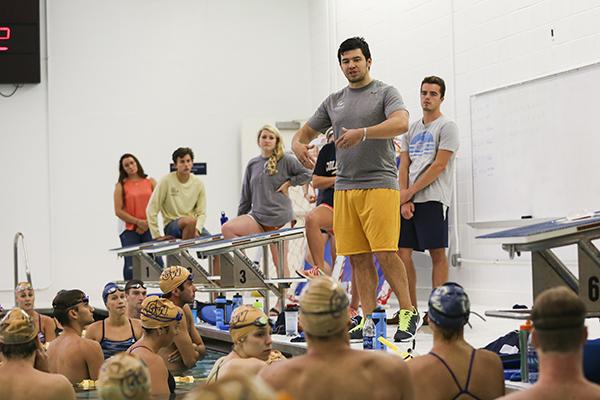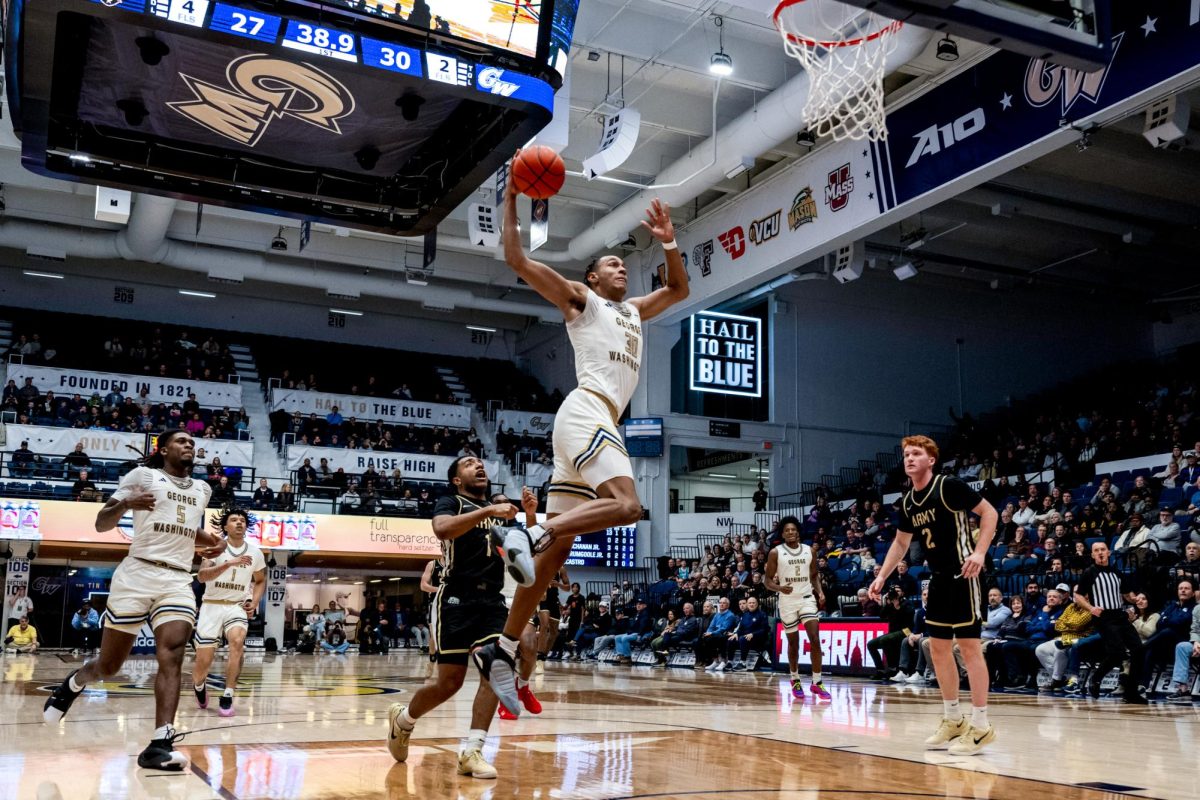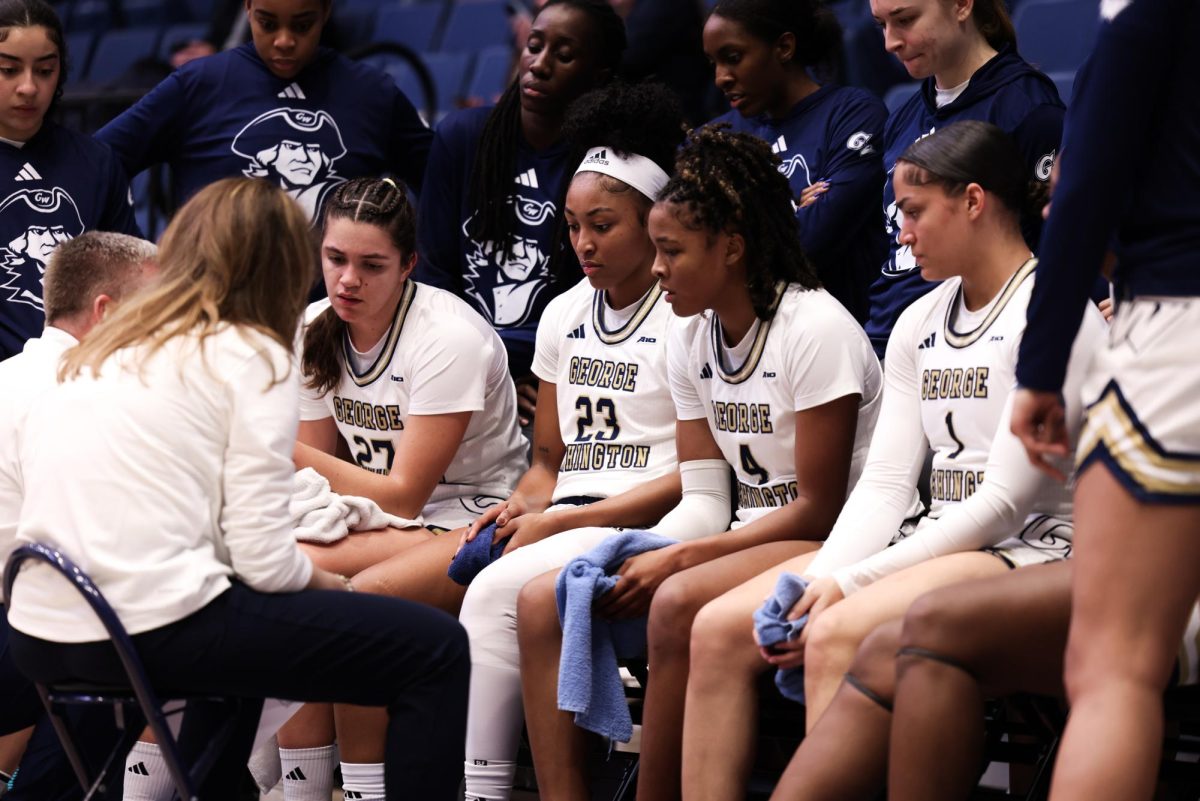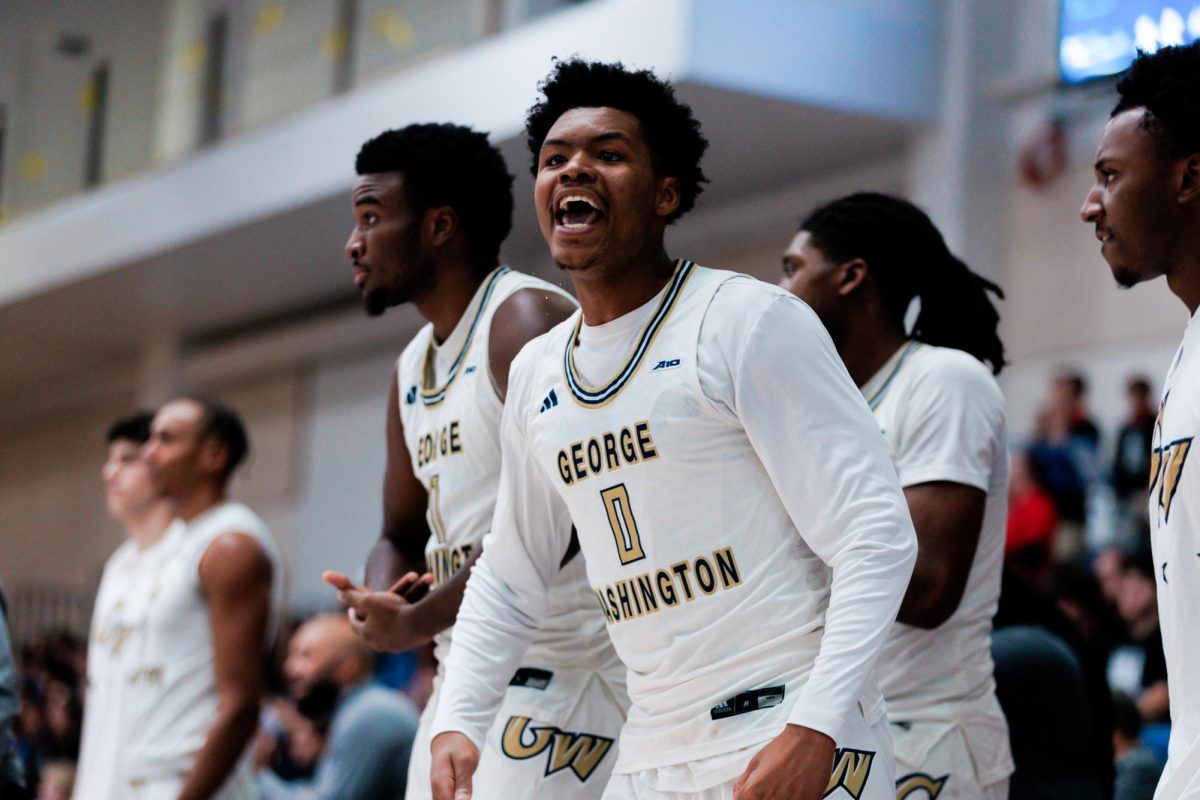James Winchester had ordered pool speakers.
He’d ordered them from either eBay or Amazon. Randy Horner, the former head swimming coach at the University of New Orleans under whom Winchester served as an assistant between 2008 and 2011, doesn’t remember which. It was 2008, the first year in the aftermath of Hurricane Katrina that UNO had fielded a co-ed team. The atmosphere was getting a bit tight in the middle of the season, one that had begun with an evacuation when Hurricane Gustav came through.
The team was in Cleveland, Miss. for the Delta State Invitational. Just before the meet began, Winchester pulled out the speakers and started a dance battle between groups of swimmers on the pool deck.
The speakers are at GW now. Winchester was hired as the head coach of the men’s and women’s swim team in April where he will try his hand again at rebuilding a program — this time, with a great deal of perspective.
“The challenges that I’ve faced so far in my career I hope I never face again, but I hope they serve me well for some of the challenges we might face,” Winchester said.
His challenge this year is to coach men’s and women’s programs that finished seventh of eight and 11th of 11 at the Atlantic 10 Championships last year, respectively. Many programs that undergo successful coaching changes win conference championships around the time the new coach’s first recruiting class graduates, and Winchester wants to win a conference championship in four years.
“Any time you have a transition, it’s not usually for the right reasons in some aspect,” Winchester said. “Like I want my athletes to be, I’m a dreamer. I believe in big goals, big visions. When the opportunity came up here, it just screamed opportunity to me about an institution that should be represented better in swimming and diving, about an institution that should be winning.”
Rebuilding from nothing
He’s certainly dealt with worse. When Winchester got to New Orleans, three years after Hurricane Katrina, the team didn’t have a pool. Theirs had been destroyed by water damage and mold. They were waiting for money from the Federal Emergency Management Agency to come in to reopen facilities. Most recruits he called thought they were still underwater, and most parents shuddered at the idea of sending their children to the city.
But in their first year of rebuilding, Winchester and Horner brought in the No. 18 recruiting class in the nation. To Horner, whom Winchester called a “mentor,” it was that success that best showed Winchester’s strength as a recruiter.
“We were selling a vision,” Horner said. “And I think that was the ultimate challenge in recruiting, to bring people in and sell them on a community that had been destroyed on national and worldwide television.”
Horner called the hire a “home run” for GW and said that he thinks the program will be competing for a conference championship in two or three years. The only thing he doesn’t like about it, he said, is that Winchester is now closer to Florida which means he will have to compete with him for more recruits.
When it was announced last March that head coach Dan Rhinehart would not return after 17 years at GW, the swimming and diving program had two commitments. When the team’s practices began last week, 15 newcomers were in the pool.
One of those newcomers is freshman Caroline Racke, a YMCA national qualifier in the 200-yard medley relay, 200-meter butterfly, 200-yard free relay and 50-meter freestyle during high school, who said that hearing of coach Winchester’s hiring got her to commit to GW.
“By the time I committed, it was actually right after they had named James as the head coach, so I had heard a lot of really good things about him, so that was definitely a motivating factor in me choosing to come to GW,” Racke said.
An old friend and a new outlook
Assistant coaches Birkir Jonsson and Katie Stefl will handle most of the recruiting duties on the men’s and women’s sides, respectively. Jonsson is a holdover from the previous staff, but he’s worked with Winchester before.
Jonsson swam for Horner and Winchester at UNO, and it was Winchester who recruited him there after he was almost set on going to another school.
Jonsson is from Iceland, and said that Winchester took the time to call him while other coaches just emailed, which made him feel more connected to the staff at UNO before he decided to go there.
“He relates to everything,” Jonsson said. “It’s really strange. No matter what, he just understands.”
That understanding was enough to get him there even with his parents’ hesitation to send him to New Orleans, though it didn’t remove the shock when he and his father arrived in the city to settle in.
“We’re driving from the airport to the university and we took a wrong turn,” Jonsson said. “So we ended up driving through a bad area. It was still kind of down, and the houses were empty for the most part, and they had the crosses on them with all the signs of the people that survived or the people that did not survive. And he was like, “This could be your last chance. Are you sure?’”
He was. Jonsson said that Winchester was the reason he went into coaching after college, and when Jonsson was hired at GW as an assistant coach in 2012, he was still in touch with Winchester by phone or text most weeks.
When he found out that Winchester was up for the job at GW, Jonsson said that he “kind of got the jitters,” and had to remind himself not to get his hopes up too much. Now, he said, he likes the freedom he’s been given in his position and is excited to learn a new approach to coaching.
Through the first couple of practices, Winchester has stripped things down to basic technique. Some swimmers have to re-learn the particular physical progressions with each stroke if they feel strange at first, and not everyone in the pool came to GW with Winchester in mind.
For sophomore Hannah Kopydlowski, it’s worth the adjustment.
“It was a little shocking because you come in and everything is new, and then you come in again sophomore year and everything is new again,” Kopydlowski said. “But I’m excited. I think it will be better than last year so it will be a good change.”
Jonsson, too, said that he can feel a new culture setting in.
“I think they’re starting to believe that they can be something, that we can actually get to the top, and I think as far as both sides, we’re going to climb up that table pretty fast,” Jonsson said. “I think the future is just really bright.”
Making better people
Lest it seem that Winchester runs his teams on belief alone, he’s also bringing serious swimming credentials to the table. He and Horner produced five national champions and the 2010 Sun Belt Conference Swimmer of the Year at UNO. But, after financial difficulties caused the athletic department to switch conferences, the successful team was cut.
Winchester then spent the last three years coaching in the Pac-12 at Utah. Overall, he has coached nine national champions, three Olympians and more than 40 All-Americans.
He’s succeeded at both mid-major New Orleans and power-conference Utah, so Winchester said he said he doesn’t worry about working with any resource gaps between smaller and larger programs.
“It kind of reminds me of the movie ‘Hoosiers’ when they go to the championship game and they measure the court and the guys have never seen a court so big,” Winchester said. “The court is measured the exact same way. And it’s the same way that I feel here.”
“You don’t need 20 pairs of sweats, you don’t need four different types of Muscle Milk flavors,” he added.
To Winchester, coaching swimming is a holistic challenge. He’s a believer in the science of the sport, but also sees his job as training swimmers’ minds to develop along with their bodies, particularly with college students. He wants to get both teams in the nation’s top 10 academically.
Part of that philosophy means taking seriously whatever swimmers come to him with. It could be easy for a man who helped a program recover after a natural disaster to see the qualms of a team with plenty of resources and a safe place to swim as trivial, but Winchester doesn’t.
“Everyone’s got problems,” Winchester said. “If it’s important to them, it should be important to me, regardless of how important it is in the greater spiel of things.”
And no matter what the problems are, Winchester tries to lighten the mood now and again. The team’s first meet is Oct. 17 at Howard University, but before then, they will go on a training trip. In their luggage will be a set of speakers for the pool deck.
It’s a simple holdover from a time when Winchester was concerned with things he’ll never have to worry about again. But it’ll also be a reminder of what he said was the defining experience of his career, and one that will guide him through his time at GW.
“So much of my time down there has shaped my beliefs on coaching and what it should be,” Winchester said. “And that is so much more than just making people faster. It’s making people better.”







